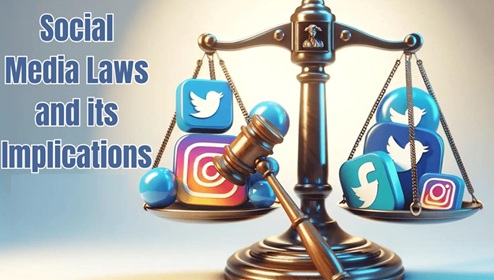| (Prelims: Current Affairs) |
Context
The central government has announced the implementation of a new accountability mechanism in the rules governing content published on social media platforms.

What's the Issue?
- The Ministry of Electronics and Information Technology (MeitY) has stated that officials who remove or issue warnings on social media will now be made more accountable.
- This move is being introduced as an amendment to the Information Technology (Intermediary Guidelines and Digital Media Ethics Code) Rules, 2021.
- The government believes that content warnings or removal notices issued by officials often lack clarity, leading to abuse of the 'safe harbor' (legal protection).
MeitY's New Safeguards
- The official issuing the notice will now be required to provide a written explanation with clear reasons.
- All orders will be issued from a higher official level (Joint Secretary and above).
- The notice will clearly state that it is a legal warning, not an order for immediate removal.
- This amendment will increase both government transparency and accountability.
|
What is Section 3(1)(d) of the IT Rules?
This provision empowers the government to flag content published on a social media platform if it is deemed harmful to national security, public order, or other sensitive interests.In this situation, the platform cannot avail of Safe Harbor Protection, meaning it will also be legally responsible for the user's content.
|
Why the Need
- Fake news, hate speech, and misinformation spread rapidly on social media.
- Arbitrary orders by officials create the potential for censorship or abuse of power.
- Therefore, the new system will ensure that the rules are implemented responsibly and transparently.
Related Concerns
- Experts say that excessive centralization of administrative power could impact free expression.
- The line between notice and warning may still create legal ambiguity.
- Tech companies believe this will increase their operational expenses and compliance burden.
Way Forward
- The government should ensure that this system does not violate freedom of expression and digital rights.
- Establishing judicial oversight and independent review mechanisms is essential.
- Social media companies should also take steps towards algorithmic transparency and responsible content moderation.
Conclusion
This amendment proposed by MeitY is an important step towards increasing accountability and transparency in digital governance. However, its success will depend on how the government maintains a balance between control and freedom.



